How To Housebreak A Puppy
Learning how to housebreak a puppy is one of your first puppy parenting responsibilities... and one of his first lessons in the way of the human world.
Housebreaking your little Rascal is really very straightforward
and you don't need a lot of fancy products or a degree in dog behavior
to get it right.
I've trained a LOT of puppies over the years, and I've learned what works and why.
On this page you'll learn about:
Getting these things right will make your job 100% easier, and help Rascal learn more quickly.
You'll also find the answers to the most common questions, including:
- When do I crate my puppy?
- How long can my puppy stay in his crate?
- What if my puppy is crying and whining in his crate?
- How do I make my puppy go potty when I take him out?
- How can I housebreak my puppy if I'm working all day?
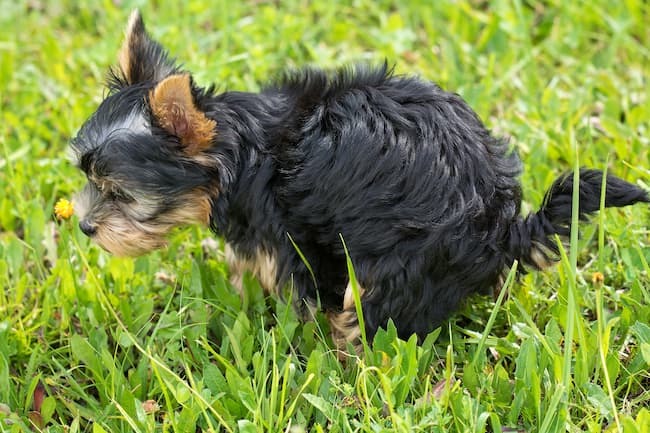
The sooner you start working with your pup, and the fewer 'accidents' he has, the better, so let's get started!
Puppy Potty Training Supplies
You don't need a lot of products, but you do need the right ones!
If there's one thing I can pick out that is the KEY to learning how to housebreak a puppy, it's keeping your pup contained and supervised until he understands what you want... and his little body is mature enough to comply!
Coming in a close second is making sure that you clean up any 'accidents' thoroughly so your little guy isn't drawn back to the same area and tempted to repeat his mistakes.
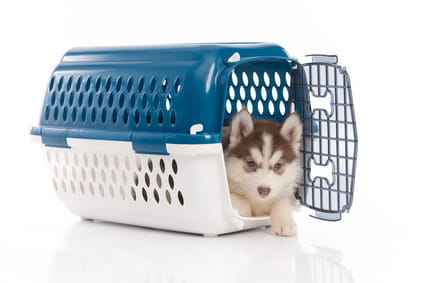
A Dog Crate (aka Dog Kennel)
A dog crate is like having your very own magic wand when it comes to housebreaking your puppy... seriously!
The majority of puppies will do their very best NOT to pee or poop in their crate for as long as their little bladders/bowels can handle it.
This gives you a huge advantage.
By using a crate properly you can help your little Rascal build bladder and bowel control and get into the habit of eliminating where and when you tell him to, right from day one.
It's important to make sure you choose the right size of crate (just big enough for him to stand up, sit down, lie down and turn around). It's not supposed to be roomy.
Also choosing a simple, sturdy plastic dog crate makes cleaning up any accidents (and chances are there will be some of these) much easier and more effective.
Dog Urine Odor/Stain Removal Products
Any books/articles you read on how to housebreak a puppy will tell you that you need to be sure to clean up any accidents thoroughly.... because you do.
But they may not tell you which products to use.
I've had a lot of practice at cleaning up puppy messes. Here are the only products that I use (because they really work!)...
- Nature's Miracle Stain & Odor Remover (for carpets & soft furnishings)
- Nature's Miracle Hard Floor Stain & Odor Remover
- Nature's Miracle Laundry Boost
- Nature's Miracle Urine Destroyer Foam
The bio-enzymatic action of this product is what makes it so effective.
When you use it properly the stains and smells are completely destroyed.
* For an extra stain-removing boost, after I've absorbed all the urine with white paper towels I soak the area with a solution of Oxyclene and water and then blot that up too. THEN I use the Nature's Miracle.
This can take color out of your carpet though, so unless it's light colored you'll need to test this on an area that's not too noticeable first.
A New Favorite Stain & Odor Remover!
There's a new kid in town.... or at least on my (very short) list of favorite dog urine cleaning products. Up until now, Nature's Miracle has been my go-to and it's never let me down.
However, on recommendation, I tried TriNova Stain & Odor remover and I was pleasantly surprised by the results. It's a 'green' product, plant based and uses natural ingredients including essential oils, this is always a plus for me.
Trinova has proved to be effective, and it smells great too.. not in an overpowering way. Plus is it works on cat urine/feces too. With six foster kittens in my house that's been a boon.
So, although I still 100% recommend Nature's Miracle products and am confident that they're one of the 'elite' when it comes to pet cleaning products, I can also say with confidence that TriNova Pet Stain & Odor Remover is a safe, effective and pleasant alternative.
Optional/Alternative Housebreaking Tools
If you don't have a safe, private outdoor area for your pup to potty in or you can't get outdoors quickly and easily (perhaps you live in an apartment, or are disabled), then you'll need an indoor potty spot.
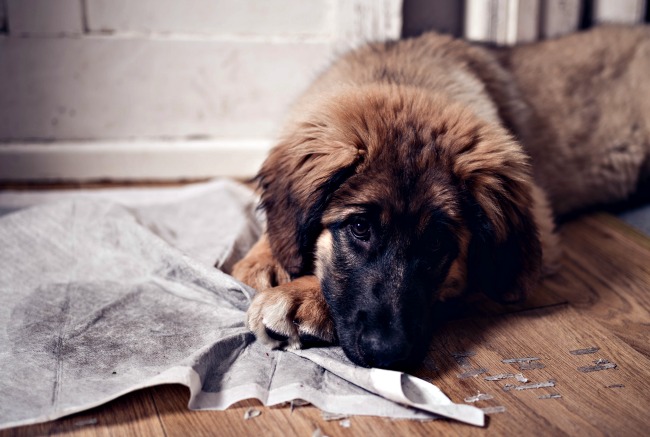
Indoor potty training options include:
- Puppy Pee Pads (as natural and eco friendly as possible eg. Four Paws Eco Pads)
- Dog Litterbox
- Portable Dog Potty (preferably real grass eg. Fresh Patch Dog Potty)
Puppies often think pee pads are for playing with rather than peeing on, and will rip, chew and even eat them.
Rascal may also prefer to dig in his litter box than do his business.
Of the three options, I believe that a portable dog potty with real grass is the best choice.
Overall, I don't recommend going this route as it can be really tricky if you want to retrain your pup to go outdoors later.
Plus it encourages your pup to think that it's okay to eliminate indoors.
But in some situations it may be the only option.
How To Housebreak A Puppy Guidelines
Potty training a puppy isn't rocket-science and it shouldn't be complicated, or strike fear into your heart!
There are two aims when you're learning how to housebreak a puppy:
- To show your pup where you want him to pee/poop and allow him to get into the right habits
- To make sure that he has minimal opportunity to make 'mistakes' elsewhere.
Containment and supervision are what makes this work, and that's where the trusty crate comes into play.
How Crate Training Works
First of all, let me say one thing loud and clear...'crate training is NOT unkind'.
Okay, good, got that off my chest!
Your little Rascal is a dog, in the wild he would live in a den, and left to his own devices any domestic dog is going to try to find a cozy place to spend his time (under the coffee table, under the deck outdoors, in his dog house etc.).
His instincts tell him not to mess in his den, and send him outside to find a suitable toilet area.
This is natural canine behavior and it's why crate training is so effective.
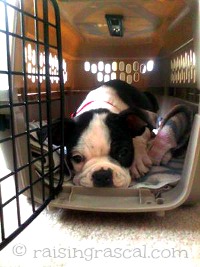
Here are the answers to the questions most new puppy owners ask about how to housebreak a puppy using a crate:
When do I crate my puppy?
Simple Answer: Whenever he isn't being supervised by you or a family member.
Because your pup is still a baby, he will happily squat and relieve himself wherever he happens to be when he gets the urge. This is not what you want to happen!
To prevent it, you need to keep your pup in his crate whenever you're not watching him closely.
Stay with him while he's indoors and not crated, whether he's eating, playing or just being loved on. Don't leave him alone and unsupervised even 'just for a minute'.
It takes about 30 seconds for a pup to sniff, squat and pee... less if he's a tiny breed pup. If you don't see him do it and correct him you're allowing him to start a really bad habit that will sabotage your potty training efforts.
How long can my pup stay in his crate?
Simple Answer: For short periods at first, extending them as he gets older.
To begin with, your little Rascal will have VERY limited control over his bladder and bowels.
If you've brought him home before he's 8 weeks old he won't even have that.
For crate training to work, you don't want him to override his natural instincts to keep his crate clean because he simply can't hold it any longer - so no leaving a young pup crated for long periods!
An 8 week old pup will need to pee approximately every 30 minutes to an hour when not crated during the day (at night he'll probably need one, two or even three potty trips to begin with).
If you've made sure he's peed and/or pooped right before you crate him, then most likely he can manage an hour before you need to give him another potty break - but every pup is different and small breed puppies need to 'go' more often than larger breeds.
Here's a quick look at what works for most puppies:
- 8 to 10 weeks - 30 minutes to 1 hour max
- 11 to 15 weeks - 1 to 3 hours max
- 16 to 19 weeks - 3 to 4 hours max
- 20 weeks and older - 4 to 6 hours
Adult dogs can stay in their crate for up to 8 hours, but if you need to do this do make sure that he is getting lots of exercise, love and one-on-one attention during the rest of his day/night.
What if my puppy is crying and whining in his crate?
Simple Answer: This is perfectly normal and he'll adjust fairly quickly.
Of course, when your precious little furball is howling, whining and generally acting as though you've abandoned him on a desert island, it's difficult NOT to feel upset and worried.
It's natural for a pup to cry and be upset when he's separated from his 'pack' (that's your family) - that's how he stays alive in the wild. But he's not in any danger here.
Young puppies can end up with what I call 'velcro-puppy-syndrome' if they never learn that it's okay to be by themselves for short periods.
Some pups are fussier if they can see you, others find it reassuring and get worked up when you're out of sight.
Either way, your little Rascal needs to learn that his crate is a place where he spends time with his special toys or takes a nap, and that you always come back for him.
Never take your pup out of his crate because he's kicking up a fuss - that just teaches him that being loud will get him what he wants.
Most pups will whinge, cry and fuss for a few minutes, then settle down. Sometimes they'll go through cycles of 'cry-whimper-settle-cry-howl-settle'.
They may do this every time you crate them for a few days, or even a week.
A few stubborn ones may cry louder, and longer, and keep it up day and night for what seems like an eternity (but is rarely more than two weeks).
Unless your puppy is showing signs of true separation anxiety (and this is rare in young puppies), simply ignore the complaints during the day.
Only let Rascal out when it's time for his next potty break, or a walk, or play-time, dinner-time or whatever.
During the night, if a pup wakes and starts crying after he's been sleeping for an hour or more, chances are he needs to go outside.
Night-time potty breaks should be no nonsense affairs. No eye contact or petting and don't talk (other than to give a potty command such as 'hurry up' or 'pee pee') and quiet praise for a job well done :)
You don't want to encourage your pup to wake up just because it's fun.
How do I make my pup go potty when I take him out?
Simple Answer: Three things are important... timing, a 'trigger word' and praise.
You can't actually make your puppy do anything, but by making sure he doesn't get a chance to accidentally relieve himself indoors before you get him to his potty spot you drastically increase your odds of success!

If you always say the same words (such as 'pee pee', 'hurry up' or 'get busy') as you encourage your little Rascal to pee/poop, then these become what's known as 'trigger words' or a 'potty phrase'.
Over time your pup will instinctively associate trigger words with the act of eliminating, to the point where just hearing the words will make him need to 'go'.
Yes, this really does work. I've done this with all my dogs.
Finally, make sure that when your puppy does his business outdoors (or wherever it is you want him to), be sure to give him lots of praise.
You should act as though he's just won you the lottery jackpot :) A tasty treat as well as all that praise doesn't go amiss either.
The exception to this rule is night-time potty breaks. You'll still want to make sure you praise your pup, but a quiet 'good boy' is enough for everyone at 2 am.
Here's a tip you might find useful....
Get into the habit of taking your puppy out to potty on a leash, even if you have a fully fenced back yard.
Why? Because at first he'll stick close by you, but as he grows older and more confident he'll run off and want to spend his time exploring rather than eliminating.
This can make for very frustrating potty trips - especially in the dark.
Plus, if he gets in the habit of peeing or pooping off-leash, once he's old enough to go on walks or to the park, it might be difficult to persuade him that his bladder and bowels still work when he's leashed!
How can I housebreak a puppy if I'm working all day?
Simple Answer: Be realistic. Use a crate. Get help for the first few weeks. Be creative.
It's not ideal to have a young puppy if you're out at work (or school) all day because puppies need a lot of your time.
But of course dog lovers have to work just like everyone else, and should we be deprived of that special dog/owner relationship because of that?
No. At least that's my personal opinion. BUT I'd also have to add that your pup shouldn't suffer because of your schedule!
Be realistic about your available time, energy level and commitment to a pup before you decide to bring one home.
If you work long hours, just want to fall into bed when you get home and chill out all weekend to recover, then a puppy isn't going to be a good fit for your life right now.
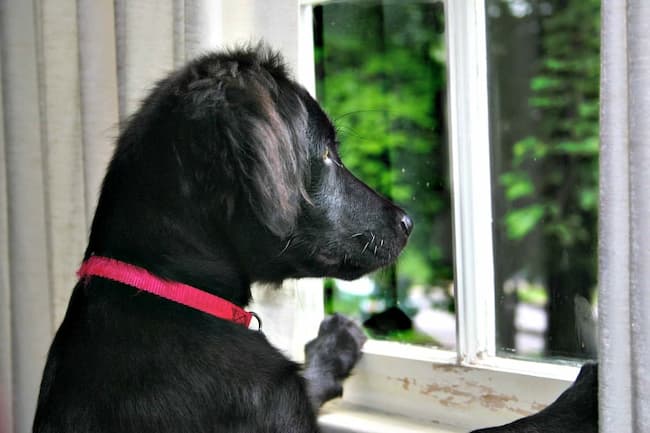
Maybe you want to consider getting an older pup or adult dog instead (although of course he'll still need time, love, attention, exercise and so on) who will be less demanding and labor intensive... or put the dog ownership on hold until you're life is more suited to it.
But, if you're simply at work or school from 9 to 5 and have lots of energy and free weekends, then getting a puppy is a possibility. An adolescent pup or adult dog should be no problem at all.
You'll definitely need to crate train your new pup but obviously he can't be left crated for hours on end or it won't work. This is where you need to be creative and get help.
First, bring you pup home when you have a few days (or preferably a week or more) off work. That way you can get a routine started and bond a little.
When you go back to work - can a relative, neighbor or friend pop in twice a day to get your pup out of his crate and give him some exercise?
Or is there a puppy playgroup or petsitting service who could help?
Don't forget....
If you're working all day, your pup/dog is going to be sleeping for most of that time.
You're going to need to fit a lot of time, attention, exercise, training and socialization into your non-working hours/days.
Don't skimp on this or you won't have the close and loving bond with your dog that you're hoping for.
Bear in mind you won't always need this, it's just for the first three to four months until your little Rascal can control his bowels/bladder better.
If this isn't possible, then you can continue to crate him at night and when you're at home, but use a puppy playpen combined with a portable indoor dog potty or even pee pads during the day when you're at work.
Set up the playpen on an easy-to-clean floor, with his potty area and a few safe, sturdy toys to keep him busy.
But be warned... chances are good that your little guy is going to think his pee pee pads/litter box/potty are playthings too. This can get messy.
A small room such as a mud room, laundry room, bathroom or kitchen can work instead of a play pen as well.
This is even the best option if you have a large or giant breed pup who's inclined to push the playpen all over the room or a little dog who's determined to climb out of it.
- Home
- How To Housebreak Your Puppy
